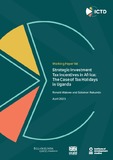| dc.contributor.author | Waiswa, Ronald | |
| dc.contributor.author | Rukundo, Solomon | |
| dc.coverage.spatial | Uganda | en |
| dc.date.accessioned | 2023-04-03T10:52:49Z | |
| dc.date.available | 2023-04-03T10:52:49Z | |
| dc.date.issued | 2023-04 | |
| dc.identifier.citation | Waiswa, R, and Rukundo, S. (2023) Strategic Investment Tax Incentives in Africa: The Case of Tax Holidays in Uganda, ICTD Working Paper 161, Brighton: Institute of Development Studies, DOI: 10.19088/ICTD.2023.013 | en |
| dc.identifier.uri | https://opendocs.ids.ac.uk/opendocs/handle/20.500.12413/17930 | |
| dc.description.abstract | Tax incentives to attract foreign direct investment are common around the world, especially
in Africa. Even though many commentators remain sceptical regarding their effectiveness,
tax incentives remain popular policy tools for governments in low-income countries seeking
to attract investors.
Like many other countries in Africa, Uganda has attempted to use tax incentives to attract
investors for decades. For many years these incentives took the form of statutory
discretionary tax holidays issued by the Executive branch of government. These
discretionary tax holidays were abolished in 1997 with the amendment of the Investment
Code Act and the introduction of the Income Tax Act. However, over the years, non-statutory
tax holidays issued by the Executive re-emerged taking the form of private agreements
between the government and specific investors. In 2018 Parliament introduced an extensive
non-discretionary statutory tax incentives regime which included a ten-year tax holiday for
investors meeting criteria set out in statute. Discretionary tax holidays issued by the
Executive were now supposed to be a thing of the past. Recent revelations that the country’s
debt to GDP ratio had exceeded 50 per cent, pressure from the donor community and wider
press coverage of tax holidays has led to greater scrutiny and public debate about tax
incentives.
This paper examines the statutory and non-statutory tax holidays in Uganda and generates
recommendations for the way forward and for how the tax holiday regime can be improved.
The research employed a mixture of methods including textual analysis, secondary data
analysis, and interviews. The textual analysis covered both primary and secondary literature
including court rulings, Parliament Hansards, the reports of Parliamentary committees, tax
laws, newspaper reports, and tax expenditure reports. Lastly, we engaged in detailed
interviews/discussions with officials from the Ministry of Finance, Planning and Economic
Development and the Uganda Revenue Authority.
The research found that tax holiday provisions in Ugandan statutes are ambiguous. They are
applied in a discriminatory manner and generally lack transparency. Further, although
Parliament has attempted to play an oversight role regarding tax holidays, this has largely
been limited to making recommendations which have been ignored by the Executive. It is
only in recent years that Parliament has taken positive steps to limit tax holidays by rejecting
proposed amendments. The research recommends the elimination of tax holidays as the
most suitable solution to the challenges posed. However, other recommendations include the
use of non-discretionary holidays, making tax holidays more transparent, using reduced rates
in lieu of tax holidays and vigilant monitoring by Parliament and civil society organisations. | en |
| dc.language.iso | en | en |
| dc.publisher | Institute of Development Studies | en |
| dc.relation.ispartofseries | ICTD Working Paper;161 | |
| dc.rights.uri | http://creativecommons.org/licenses/by/4.0/ | en |
| dc.subject | Finance | en |
| dc.title | Strategic Investment Tax Incentives in Africa: The Case of Tax Holidays in Uganda | en |
| dc.type | Series paper (non-IDS) | en |
| dc.rights.holder | Institute of Development Studies 2023 | en |
| dc.identifier.doi | 10.19088/ICTD.2023.013 | |
| rioxxterms.funder | Default funder | en |
| rioxxterms.version | VoR | en |
| rioxxterms.versionofrecord | 10.19088/ICTD.2023.013 | en |


